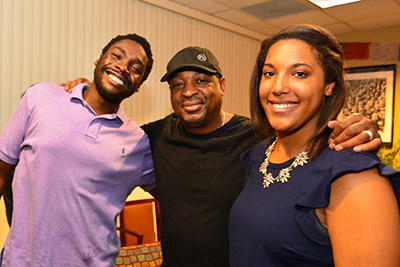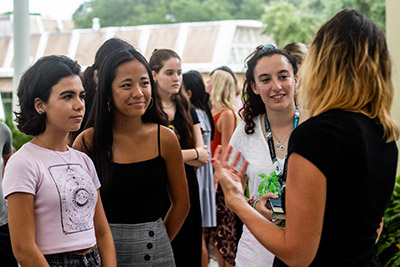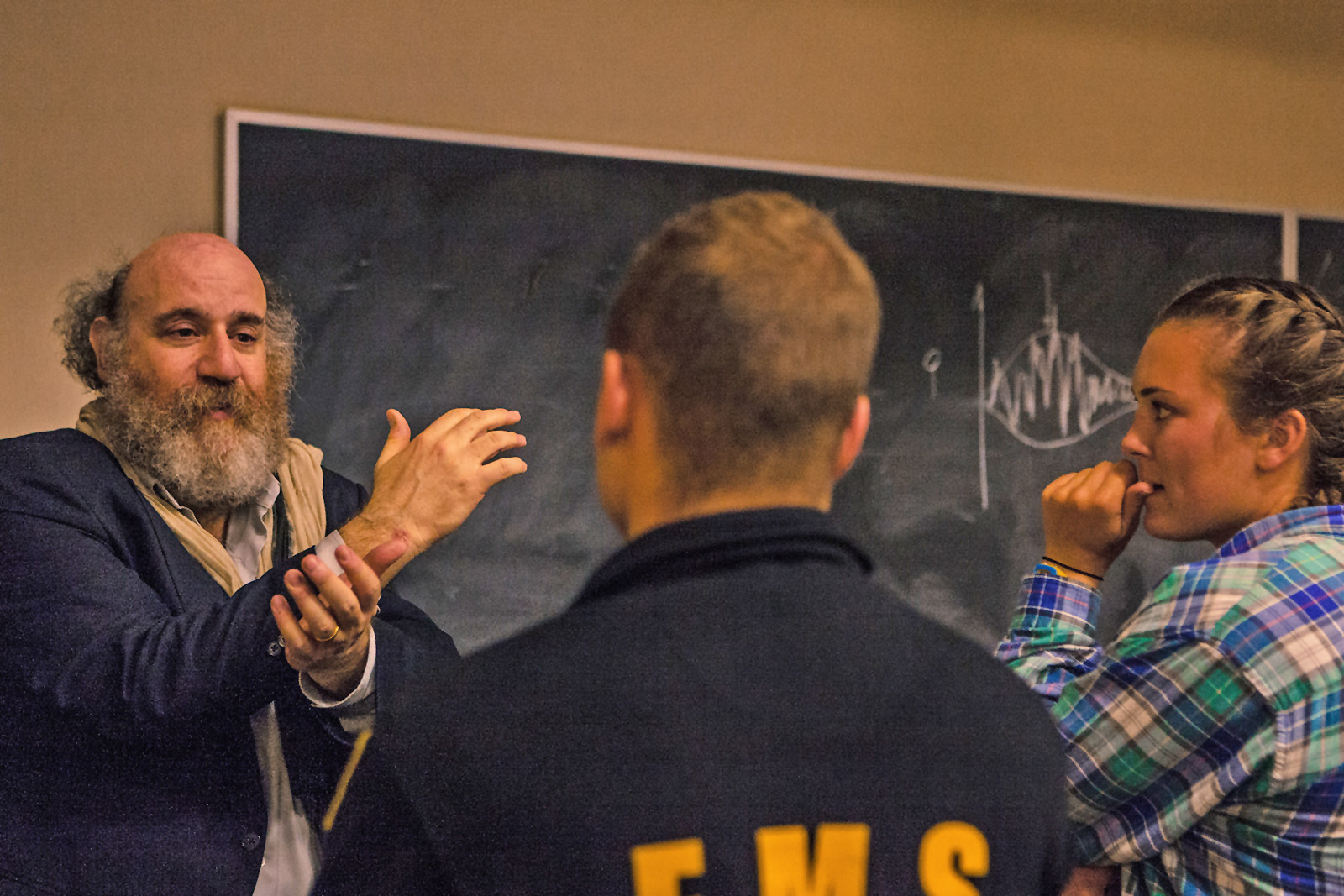Nurturing a taste for culture
Throughout the year, we bring well-known authors, artists, scientists and other visiting scholars to campus to talk about everything from climate change to immigration to masculinity as portrayed on TV.
They’re part of our College Program Series, which includes films, concerts, lectures and readings. A lot of these are also open to the public, as shown on our public events calendar.
Not everything we learn comes to us through classroom readings.
The visceral power of music, the total sensory immersion of a riveting film, the pleasure of fiction read to us—these can move us in much deeper ways than the written word alone.
It’s a great opportunity to have your mind opened—for free.

Lulu Miller, author of “Why Fish Don’t Exist,” and cellist Wes Swing choreographed words and music in a powerful presentation.

Chuck D, leader of the ’80s hip-hop group Public Enemy, presented how to use geography and history to find your place in the world.
Visiting scholars
The Class of 1968 Distinguished Visiting Scholar Endowment funds a program that brings a renowned expert to Eckerd’s campus to lecture, discuss pedagogy, and meet informally with faculty and students.
The individual’s book is assigned as summer reading to first-year students in the Human Experience course, and the distinguished visiting scholar gives a public address as well as class lectures.
Scholars are chosen who will enrich the General Education program and reflect the College’s global, environmental and service values.

The Distinguished Visiting Scholar Endowment affords students opportunities to engage experts right on campus.
2023 distinguished visiting scholars

Dr. Danielle Allen is a professor of public policy, politics and ethics at Harvard University; director of the Edmond and Lily Safra Center for Ethics; and James Bryant Conant University Professor—one of Harvard’s highest honors. Allen’s landmark critical reading and interpretation of the Declaration of Independence, Our Declaration: A Reading of the Declaration of Independence in Defense of Equality, is part of our first-year curriculum in Human Experience, and next year her latest book, Justice by Means of Democracy, will be included in the Imagining Justice curriculum.
As our students grow more pessimistic about their present and future participation in politics, the time is right for Allen’s inspiring but realistic messages about overcoming political despair. Additionally, Allen’s education and academic trajectory are noteworthy. She holds two doctorates—one in classics and a second in political science—and her work is deeply synthetic, resisting the tensions between the historical and the present.


Elizabeth Rush is the author of Rising: Dispatches from the New American Shore, a finalist for the Pulitzer Prize. Central to Rush’s writing practice is the act of listening: listening to those who live in frontline climate-changed communities, listening to Antarctica’s great glaciers as they go to pieces, listening to all those voices long locked out of environmental conversations.
Rush spent many years reporting from coastal communities already feeling the pressure of higher tides and stronger storms. In Rising, she weaves together her personal experience with firsthand testimonials of those living on climate change’s front lines, guiding readers through some of the places where sea level rise is a reality. Hailed as “deeply felt” (The New York Times), “a revelation” (Pacific Standard), and “the book on climate change and sea levels that was missing” (Chicago Tribune), Rising is both a highly original work of lyric reportage and a haunting meditation on how to let go of the places we love.
Rush’s work has appeared in a wide range of publications, from The New York Times to Orion to Guernica. She has received fellowships from the National Science Foundation, National Geographic, the Alfred P. Sloan Foundation, the Howard Foundation, the Andrew Mellon Foundation and the Metcalf Institute. Today she lives with her husband and son in Providence, Rhode Island, where she teaches creative nonfiction at Brown University.

Previous visiting scholars
2022: Jessica Goudeau
Jessica Goudeau has written for The Atlantic, The Washington Post, Los Angeles Times, Teen Vogue, among other places, and is a former columnist for Catapult. She produced projects for Teen Vogue (“Ask a Syrian Girl”) and A Line Birds Cannot See, a documentary about a young girl who crossed the border into the U.S. on her own. She has a Ph.D. in literature from the University of Texas and served as a Mellon Writing Fellow and Interim Writing Center Director at Southwestern University. Goudeau has spent more than a decade working with refugees in Austin, TX and is the cofounder of Hill Tribers, a nonprofit that provided supplemental income for Burmese refugee artisans for seven years.
2021: Lulu Miller
Lulu Miller is the cohost of Radiolab, cofounder of NPR’s Invisibilia, and a Peabody Award–winning science journalist. Her writing has been published in The New Yorker, VQR, Orion, Electric Literature, Catapult, and beyond. Her favorite spot on earth is Humpback Rocks.
2020: Madeline Miller
Madeline Miller’s first novel, The Song of Achilles, was awarded the 2012 Orange Prize for Fiction and was a New York Times bestseller. Her second novel, Circe, was an instant #1 New York Times bestseller. Before she was a novelist, Madeline Miller earned her B.A. and M.A. in Classics from Brown University, and she taught and tutored Latin, Greek and Shakespeare to high school students for more than fifteen years. Her novels have been translated into over twenty-five languages, and her essays have appeared in the Guardian, Wall Street Journal, Lapham’s Quarterly and on npr.org.
2019: Peter Godfrey-Smith
Peter Godfrey-Smith, author of Other Minds: The Octopus, the Sea, and the Deep Origins of Consciousness and professor in the School of History and Philosophy of Science at the University of Sydney, is an Australian philosopher of science specializing in the philosophy of mind and its relationship with the philosophy of biology. He also is an experienced diver. His 2016 bestseller, Other Minds, compares the consciousness in cephalopods, especially the octopus and cuttlefish, with that in mammals and birds.
2018 Scholar: Claudia Rankine
Claudia Rankine—the Frederick Iseman Professor of Poetry at Yale University, poet, playwright, essayist and author of Citizen: An American Lyric—has used her art to examine her relationship with her country and her compatriots. Her visceral collection of poetry, Citizen, won the PEN Open Book Award, the PEN Literary Award, the NAACP Award and the National Book Critics Circle Award for Poetry (Citizen was the first book ever to be named a nominee in both the poetry and criticism categories). It also was a finalist for the National Book Award.
2017 Scholar: Matthew Desmond
Matthew Desmond, Ph.D., professor of sociology at Princeton University and the Class of 1968 Distinguished Visiting Scholar at Eckerd College, was awarded a 2017 Pulitzer Prize in general nonfiction for writing Evicted: Poverty and Profit in the American City. At Eckerd he discussed his research involving eight families from Milwaukee, which focuses on a topic largely unexplored: the role of rising rents and rampant evictions in feeding a cycle of poverty and despair in the U.S.
2016 Scholars: Eboo Patel and Noah Strycker
Author of Acts of Faith (2007) and Sacred Ground (2012), Eboo Patel engages students and community members about the responsibilities of citizenship in the U.S. Patel is an American Ismaili of Gujarati Indian heritage and founder and president of Interfaith Youth Core, a Chicago-based international nonprofit that aims to promote interfaith cooperation.
Noah Strycker is the author of The Thing With Feathers: The Surprising Lives of Birds and What They Reveal About Being Human (2014). He has dedicated his life to the science of birds, winning the American Birding Association’s Young Birder of the Year Award in 2004. Strycker graduated from Oregon State University in 2008 with a Bachelor of Science degree in Fisheries and Wildlife and a Minor in Fine Arts. He works as an associate editor for Birding magazine and regularly writes for Audubon magazine.
2015 Scholars: Charles Blow and Martha Craven Nussbaum
Charles Blow is an American journalist and a visual op-ed columnist for The New York Times, where he focuses on politics, public opinion and public justice. His book, Fire Shut Up in My Bones, is a beautifully written coming-of-age memoir describing his trajectory from deep poverty in rural Louisiana to becoming a distinguished college graduate. Blow grew up in Gibsland, La.; graduated magna cum laude from Grambling State University; and worked as a graphics director and art director for the Times and National Geographic. A single father of three who lives in Brooklyn, he is a frequent commentator on CNN and MSNBC.
Martha Craven Nussbaum, the Ernst Freund Distinguished Service Professor of Law and Ethics at The University of Chicago Law School, has been called “one of the most remarkable and luminous minds of our time.” Nussbaum argues in support of the revolutionary movements of Mohandas Gandhi, Martin Luther King Jr. and Nelson Mandela that were based on a commitment to justice through peace not anger.
2014 Scholar: Sonia Nazario
Sonia Nazario has written about social issues for more than two decades, most recently as a projects reporter for the Los Angeles Times. She holds the distinctions of winning the 2003 Pulitzer Prize for Feature Writing and of being the youngest writer to be hired by the Wall Street Journal. She grew up both in Kansas and Argentina. She permanently moved to the U.S. as the Dirty War was happening in Argentina.
2013 Scholar: Katherine Boo
Katherine Boo has been a staff writer at The New Yorker since 2003, focusing on issues of poverty, opportunity, social and economic policy, and education. She has received a Pulitzer Prize for Public Service, a National Magazine Award for Feature Writing, and a MacArthur “Genius” Award. New York Times bestseller and National Book Award winner Behind the Beautiful Forevers: Life, Death and Hope in a Mumbai Undercity is her first book and the Human Experience summer reading assignment for first-year students and a Quest for Meaning reading for seniors.
2012 Scholar: Tracy Kidder
Author Tracy Kidder – winner of the Pulitzer Prize, National Book Award and Robert F. Kennedy Award – launched Eckerd College’s 2012-13 Presidential Events Series, “Cultivating Service: People, Politics, Planet.” Mr. Kidder gave a public lecture moderated by Colette Bancroft, book editor for the Tampa Bay Times, about finding subjects for his literary nonfiction. “Stories can get you to places where you can’t get otherwise,” he explained to students.
Mr. Kidder taught and mentored on Eckerd’s campus as the Class of 1968 Distinguished Visiting Scholar for a weeklong residency. During that time, he gave a series of lectures, attended classes and held office hours to meet individually with students. Mr. Kidder’s books Strength in What Remains and Mountains Beyond Mountains were assigned readings to Eckerd’s first-year students and seniors, respectively.
2011 Scholar: Janisse Ray
Janisse Ray is a writer, poet, naturalist and activist who has authored three books of literary nonfiction. Ecology of a Cracker Childhood, Ms. Ray’s memoir about growing up on a family-owned junkyard in rural Georgia and becoming an environmental advocate, was assigned to first-year students in Eckerd’s Human Experience course. Ms. Ray launched Eckerd College’s 2011-12 Presidential Events Series, “Environmental Challenges, Sustainable Solutions,” with a public lecture in which she encouraged students to pursue a sustainable lifestyle and envisioned “the remake of the world in which you and I can be fully human.”
2010 Scholars: Dave Eggers and Gabriel Bol Deng
From January to December 2010, “The Plight and Promise of Africa: An Eckerd College Initiative” raised Africa’s profile through academic study, activism and community consciousness by engaging the members of Eckerd’s campus and the residents of Tampa Bay in classroom conversation and public discussion about Africa.
In What Is the What: The Autobiography of Valentino Achak Deng, bestselling author Dave Eggers describes the odyssey of Valentino Achak Deng, one of the “Lost Boys” of Sudan, as he journeys from southern Sudan to a temporary shelter in Ethiopia, to a refugee camp in Kenya, and finally, to Atlanta. What Is the What, a finalist for the 2006 National Book Critics Circle Award and winner of France’s Prix Medici, was assigned as the summer reading to first-year students. Mr. Eggers and Gabriel Bol Deng, a fellow Lost Boy of Valentino Achak Deng, addressed the freshman class and gave a public lecture moderated by Colette Bancroft of the Tampa Bay Times.
2009 Scholar: Ray Arsenault
Dr. Raymond Arsenault is the John Hope Franklin Professor of Southern History at University of South Florida and the author of Freedom Riders:1961 and the Struggle for Racial Justice. The book was named an Editor’s Choice by The New York Times and one of the Best Books of 2006 by The Washington Post, and won the 2006 Owsley Prize of the Southern Historical Association as the best work in Southern history. He spoke to Eckerd’s first-year students in Western heritage in January. His book was the basis for the 2011 PBS documentary Freedom Riders which won three Emmy Awards and a Peabody Award. Dr. Arsenault delivered the “What is Power?” lecture to the first-year students.








